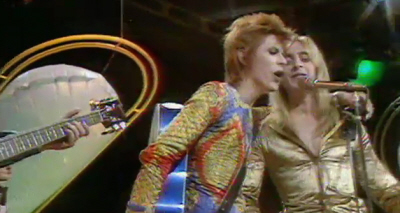Ziggy Starduast
The alter-ego of David Bowie
Of course, glit-rock was all just a silly and short-lived phase, but it had substance, too. It was a lurid reminder that 70s Britain was a more expressive kind of country. Even in Britain's factories, the boots and boiler suit uniform were being updated. Still let's not get carried away. All the hair in the world couldn't make up for the daily reality of hard grind, and tight knit, working-class communities, where the old rhythms of masculine tradition ran slow and deep.
But the boundaries were to be pushed even further, when a strange creature landed in central London. Ziggy Stardust is the human manifestation of a creature from outer space, fallen to earth to bring a message of peace and love to all humanity. In reality, of course, Ziggy was merely the persona of the rock star, David Bowie, whose album The Rise and Fall of Ziggy Stardust and the Spiders from Mars, hit the charts in the summer of 1972.

Ziggy Stardust
The key to Ziggy's appeal wasn't just that he was an alien, it was that he was an alien in a dress. Ziggy Stardust made David Bowie into an international superstar.
